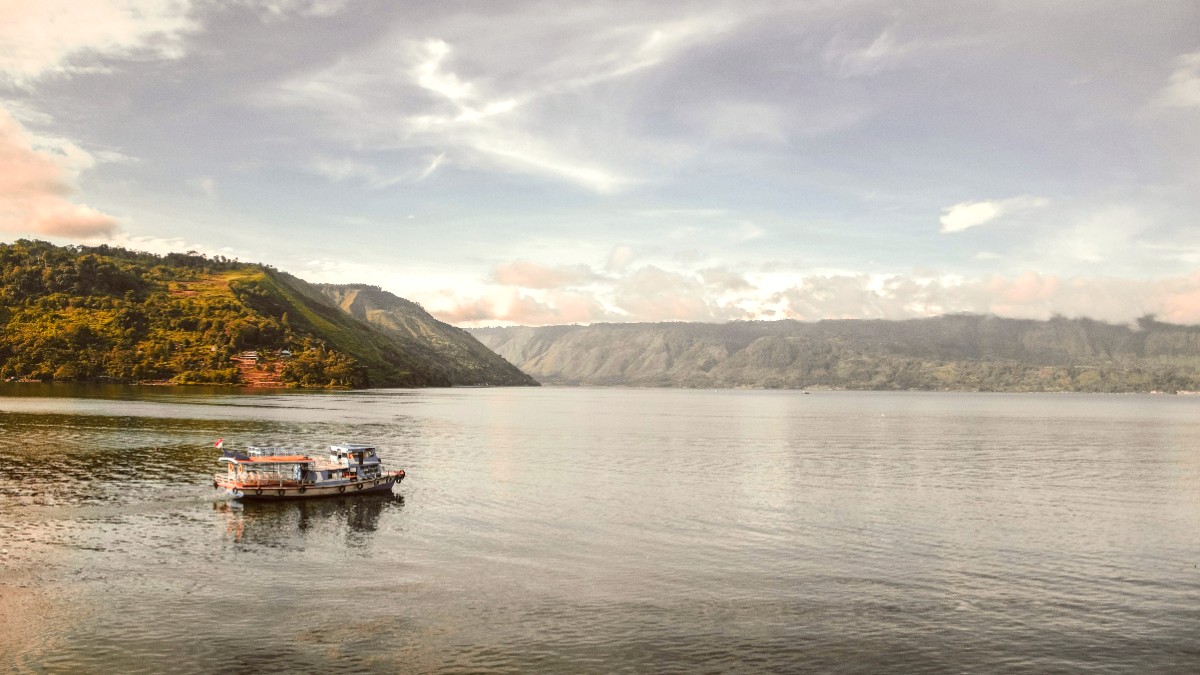
Indonesia
The region experiences a tropical climate throughout the year, with consistent temperatures and high humidity, usually ranging from 25°C to 32°C (77°F to 90°F) in the lowlands. Higher altitudes, like Berastagi and Lake Toba, present noticeably cooler and more comfortable temperatures, especially in the evenings, which can drop to around 20°C (68°F) or even lower during the dry season.
North Sumatra has two main seasons: Dry Season (May to September) with sunny days and lower humidity, and Wet Season (October to April) with higher rainfall and humidity. Rains typically occur as short, heavy bursts, often in the afternoon.
High Season (July-August, December-January): Weather typically dry, high visitor numbers, higher prices. Booking in advance is suggested.
Shoulder Season (May-June, September-October): Good weather balance with fewer crowds, potentially lower prices. Low Season (November, February-April): Fewer tourists, lower prices, but increased rainfall and potential for muddy trails.
Mount Sinabung remains highly active.
Its status changes frequently. Areas near it are often restricted for safety.
Avoid approaching unless local authorities confirm safety. Mount Sibayak is generally safe for trekking.
Wet season rainfall patterns.
Leads to heavier and more frequent rainfall, specifically from November to February.
Rain usually comes in short, intense bursts, but prolonged periods can occur.
Highlands offer cooler temperatures.
Berastagi and Lake Toba can drop to around 20°C (68°F) or lower.
Bring a light sweater or jacket for cooler highland conditions.
Weather typically dry, ideal for outdoor activities. Coincides with holidays. Many international travelers visit, meaning more opportunities to meet other tourists.
Fewer tourists, a more authentic and quiet experience. Prices for accommodation and tours are often at their lowest. Landscape becomes incredibly lush and green due to consistent rainfall.
High season sees more crowds and higher costs for lodging and flights.
Booking well in advance is suggested for high season periods.
May-June, Sep-Oct offer good weather and fewer crowds for value.
Increased rainfall could affect outdoor plans; some road closures are possible.
Travel plan flexibility is useful during low season months.
Indonesia has specific rules for different nationalities. Check the latest requirements from official sources before your travel dates, as regulations can change.
Indonesia has options for tourist entry, including Visa-Free Entry for stays up to 30 days for many countries, and Visa on Arrival (VoA) for approximately 90 countries.
Ensure readiness with these documents for immigration. Validity for your passport is at least 6 months from your entry date.
North Sumatra presents travel options for various budgets. The local currency is the Indonesian Rupiah (IDR). Banknotes range from 1,000 to 100,000 IDR.
These are approximate daily costs. Actual spending varies based on choices.
Budget Traveler (Backpacker): IDR 300,000 - 600,000 (US$20-40) per day. Stay in hostel dorms or basic guesthouses. Rely on street food stalls and local markets. Utilize public buses and shared taxis. Focus on free or low-cost attractions.
Mid-range Traveler: IDR 700,000 - 1,500,000 (US$50-100) per day. Stay in mid-range hotels or comfortable guesthouses. Enjoy a mix of local restaurants and some mid-range eateries. Use ride-sharing apps, occasional taxis, or arranged private cars. Budget for entrance fees and some guided tours.
Prices per night range from IDR 100,000 for hostel dorms to IDR 3,000,000+ for luxury hotels. Guesthouses and mid-range hotels fall between.
Hostel Dorm: IDR 100,000 - 200,000
Luxury Hotel: IDR 1,000,000 - 3,000,000+
Street food is very affordable, while mid-range to luxury dining naturally costs more. Alcohol is more expensive than food.
Street Food Dish: IDR 15,000 - 40,000
Mid-range meal: IDR 80,000 - 200,000
Local transport options are very budget-friendly, while private cars or airport transfers are naturally higher priced.
Angkots/Local Bus: IDR 5,000 - 10,000
Private Car/Day: IDR 200,000 - 500,000+
| Item | Approx. Price (IDR) | Notes |
|---|---|---|
| Local Coffee/Tea | 10,000 - 30,000 | Affordable local drinks. |
| Local Beer (small) | 30,000 - 60,000 | Alcohol more expensive than food. |
| Motorbike Rental (daily) | 70,000 - 150,000 | On Samosir/Berastagi. |
Proactive steps and awareness of available resources in North Sumatra are wise.
Visit a travel doctor 4-6 weeks before your trip for personalized advice.
Ensure Measles-Mumps-Rubella (MMR), Diphtheria-Tetanus-Pertussis, Polio, and Chickenpox are current.
Highly suggested for all travelers to Indonesia.
Typhoid, Rabies, and Japanese Encephalitis are generally suggested for specific travel patterns or longer stays. Yellow Fever certificate is necessary if from/transiting risk countries.
Typhoid for eating outside major hotels or staying in rural areas. Rabies for long-term travelers or contact with animals. Japanese Encephalitis for month-long stays in rural areas during peak season.
No mandatory health entry requirements for general tourism, but Yellow Fever is an exception.
Always check the WHO list of Yellow Fever endemic countries.
Drink only bottled, filtered, or boiled water. Avoid ice. Eat well-cooked food. Carry Anti-diarrhea medication. Frequent hand washing or Hand sanitizer use is suggested.
Dengue fever is prevalent. Malaria risk exists in some remote regions. Use Insect repellent with DEET or Picaridin. Wear long sleeves/pants in evenings. Consider a Mosquito net in basic accommodations.
Stay hydrated. Wear a Wide-brimmed hat and sunglasses. Use High-SPF, broad-spectrum sunscreen.
Rabies is present in stray animals. Avoid direct contact with wildlife. If bitten, seek immediate medical attention. Post-exposure prophylaxis is necessary.
North Sumatra is generally safe for tourists. Petty crime occurs in crowded areas of Medan (pickpocketing, bag snatching). Use hotel safes for valuables.
Avoid walking alone in poorly lit or deserted areas. Use reputable taxis or ride-sharing services.
Be wary of common scams (gambling, "tea ceremonies"). Research common travel scams.
Indonesia sits in the "Ring of Fire." Volcanic activity (Sinabung), earthquakes, and wet season flooding/landslides are possible. Monitor advisories.